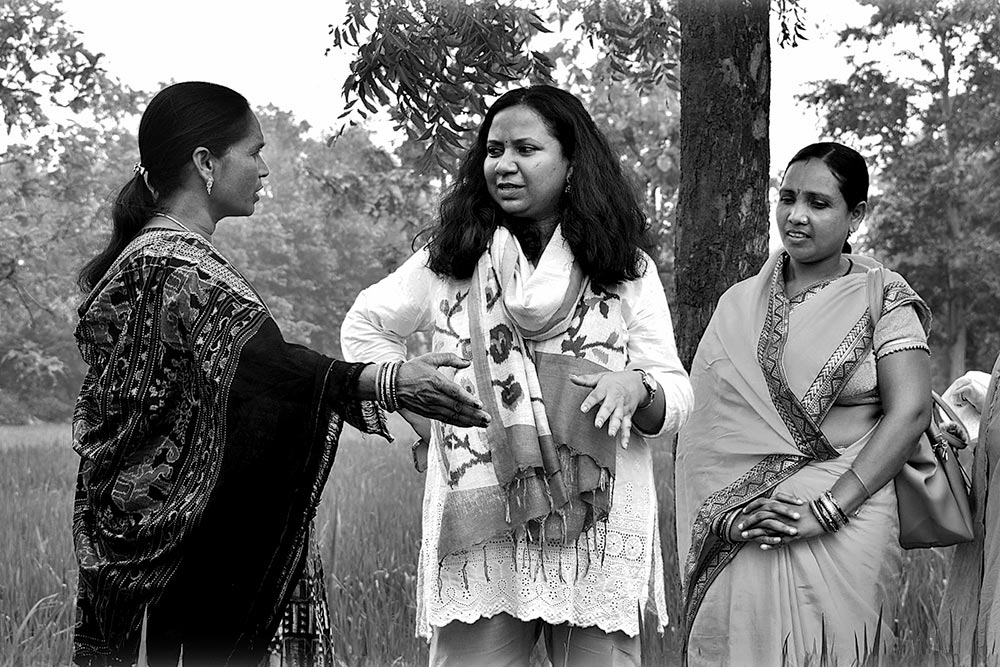In September this year, Swati Nayak, an agriculture scientist, became the third Indian to be named the recipient of the prestigious Norman E. Borlaug award for field research and application, by the World Food Prize Foundation, for her work in field application and bridging the gap between scientists and farmers. The award, which recognises those fighting to eliminate global hunger and poverty, bears testimony to her years of work in innovation in agriculture, driven by the passion to empower the community.
Throughout her career, Nayak has single-mindedly sought to secure equity and enhance access of farmers to new and emerging varieties of seeds, thereby bridging the gap between the lab and the farm. She is fondly called Bihana Didi, an Odia term that translates as “seed sister”, by the farmers of Odisha—she was instrumental in introducing the Sahabhagi Dhan, a drought-resistant variety of rice, in Odisha, which altered the lives of countless farmers. Besides India, she has also successfully introduced several climate-resistant rice varieties in Bangladesh and Nepal.
Embracing the Fields
Nayak developed a passion for agriculture during her academic years, which led her to pursue a bachelor’s degree in agriculture and a master’s in rural management. She later joined the International Rice Research Institute, where she is currently the South Asia Regional Seed System and Product Management Lead.
“I had enough exposure to the basic science of agriculture, and now I wanted to go for something more application-based. Agriculture is acceptable as a science course, but at the end of the day, it is a livelihood for millions. We all have been working on how to strengthen it and what more can be done to make it more of an enterprise,” she says.
Her focus has always been on making sure that new agricultural technologies are accessible to those who stand to benefit from them the most. According to her, many farmers are probably unaware of the availability of new technologies which could potentially revolutionise their farming practices. There is a need to do much more to create sufficient awareness about and access to new generational seeds, she feels. Another concern, Nayak says, is India’s slow seed replacement rate. The new generation seeds must be aggressively positioned in the supply chain and adopted faster, she says.
Championing Gender Equality
Women have traditionally been involved in activities such as seed selection, cleaning and drying. Even today, they are heavily involved in agriculture at the household level but their names are missing in official records, Nayak points out. Her work focuses equally on women farmers.
She was involved in Mahima Kisan Sashaktikaran Pariyojna, an initiative focusing on women farmers’ empowerment under National Rural Livelihood Mission. She has also imparted training in varietal selection, production and marketing of seeds and business development to several women’s groups in South Asia. She and her team have helped many women-owned and smallholder farmers-led seed production companies get off the ground through rigorous skill development, not just in technical and scientific areas of quality seed production but also in business aspects, seed quality assurance, certification and regulatory aspects as well as market linkages.
Working for Change
Climate change affects agriculture in various ways, and has a direct impact on farmers’ lives. Nayak has been working on developing climate-resilient seeds. Scaling and enhancing access to these seeds should be improved because they are low-cost interventions protecting farmers from crop loss during drought, flood or other climatic stress, she emphasises. “These varieties can ensure yield and production for farmers. The latest developments must be communicated to farmers to educate them about the new varieties that have been developed and to ensure that they are widely distributed to replace old types of seeds,” says Nayak.
Nayak has ambitious plans to improve the agriculture ecosystem. She believes that new generation seeds should be promoted among the growers of the country and should be made available to them in a localised manner. This is critical to ensure sustained adoption, and she intends to work closely with farmers and institutions to influence programmes and policy-making processes.











